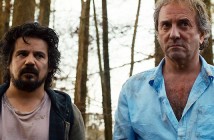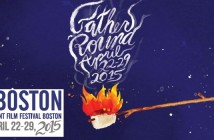Cast: Kang-sheng Lee, Denis Lavant
Director: Tsai Ming-liang
Country: France | Taiwan
Editor’s Notes: The following review is part of our coverage of the 2014 Berlin International Film Festival. For more information on the festival visit http://www.berlinale.de and follow Berlinale on Twitter at @berlinale.
Critical favourite Tsai Ming-liang teams up with Lee Kang-sheng for a third time (after the recent Walker and Walking on Water), as the latter assumes yet again the role of the Bhuddist monk who treads the world with the slowest of motions. On this occasion, Kang-sheng’s hyper-languid mobility is set against the backdrop of Marseilles, from the rubble of a ruin to the front of a tea room by way of the seaside. While the film consists almost entirely of patience-testing shots of the monk as the city life bustles dynamically around him, its opening shot is an extreme close-up of Denis Lavant’s face, a landscape of crevices, imperfections, shadows and distinctive sadness.
Tsai Ming-liang might be proposing we re-assess the way we look around us, but it’s arguably even more striking as a re-assessment of how we watch movies.
There is perhaps little point in systematically describing every shot that comprises its 56-minute runtime, but one in particular does strike me as perfectly encapsulating the gist of Tsai Ming-liang’s exercise in composure. The camera is stood at the bottom of long sheltered stairway, angled upwards as Kang-sheng stands atop it, ever so slowly making his descent. The shot records the monk’s entire undertaking of the descent, its gradual tilt barely perceptible, as passers by overtake him, consider him with curiosity or simply ignore him. A young girl stops and stares confusedly, a family address the unseen director to ask him if they may go through, and a youth yells “are they shooting a porn film?” while his friend hides his face. With shots this unhurried, the eye is naturally drawn to what occurs around him, forcing us to explore every inch of the frame in a way audiences aren’t accustomed to.
 In Walker (2012), Tsai Ming-liang seemed to suggest a man whose meditative pace set him apart from a modern world too fast for its own good. In Journey To The West (Xi You) however, the subject seems less the world around him, than the people staring at the screen, as suggested by a quote etched on the screen which argues that we’ve been taught to see life like a “flickering flame or a flash of thunder”. His latest film is a response to the ephemeral quality of the way we observe the world, in which he offers an opportunity to truly take in the images before our eyes, with Kang-sheng as our guide. To further illustrate his point, the pained Lavant of the opening shots is replaced with a reinvigorated Lavant, now mimicking the monk’s lethargic stroll.
In Walker (2012), Tsai Ming-liang seemed to suggest a man whose meditative pace set him apart from a modern world too fast for its own good. In Journey To The West (Xi You) however, the subject seems less the world around him, than the people staring at the screen, as suggested by a quote etched on the screen which argues that we’ve been taught to see life like a “flickering flame or a flash of thunder”. His latest film is a response to the ephemeral quality of the way we observe the world, in which he offers an opportunity to truly take in the images before our eyes, with Kang-sheng as our guide. To further illustrate his point, the pained Lavant of the opening shots is replaced with a reinvigorated Lavant, now mimicking the monk’s lethargic stroll.
Tsai Ming-liang might be proposing we re-assess the way we look around us, but it’s arguably even more striking as a re-assessment of how we watch movies. Never have I been so aware of my scrutinizing of the screen’s entire area, with the exception perhaps of the final scene of Haneke’s Caché (2005). In both those cases, the whole took precedence over the particular, in the latter because we were forced to desperately search for a point of focus, in Journey to The West because its very point of focus is the trigger for a new awakening of the eye. Its extreme sluggishness makes it something of a gruelling experience, but the thoughtful implications that emanate from such a minimalist project only further solidify the director’s position as one of the most challenging, but also rewarding, working filmmakers.
[notification type=”star”]79/100 ~ GOOD. Its extreme sluggishness makes it something of a gruelling experience, but the thoughtful implications that emanate from such a minimalist project only further solidify the director’s position as one of the most challenging, but also rewarding, working filmmakers.[/notification]



